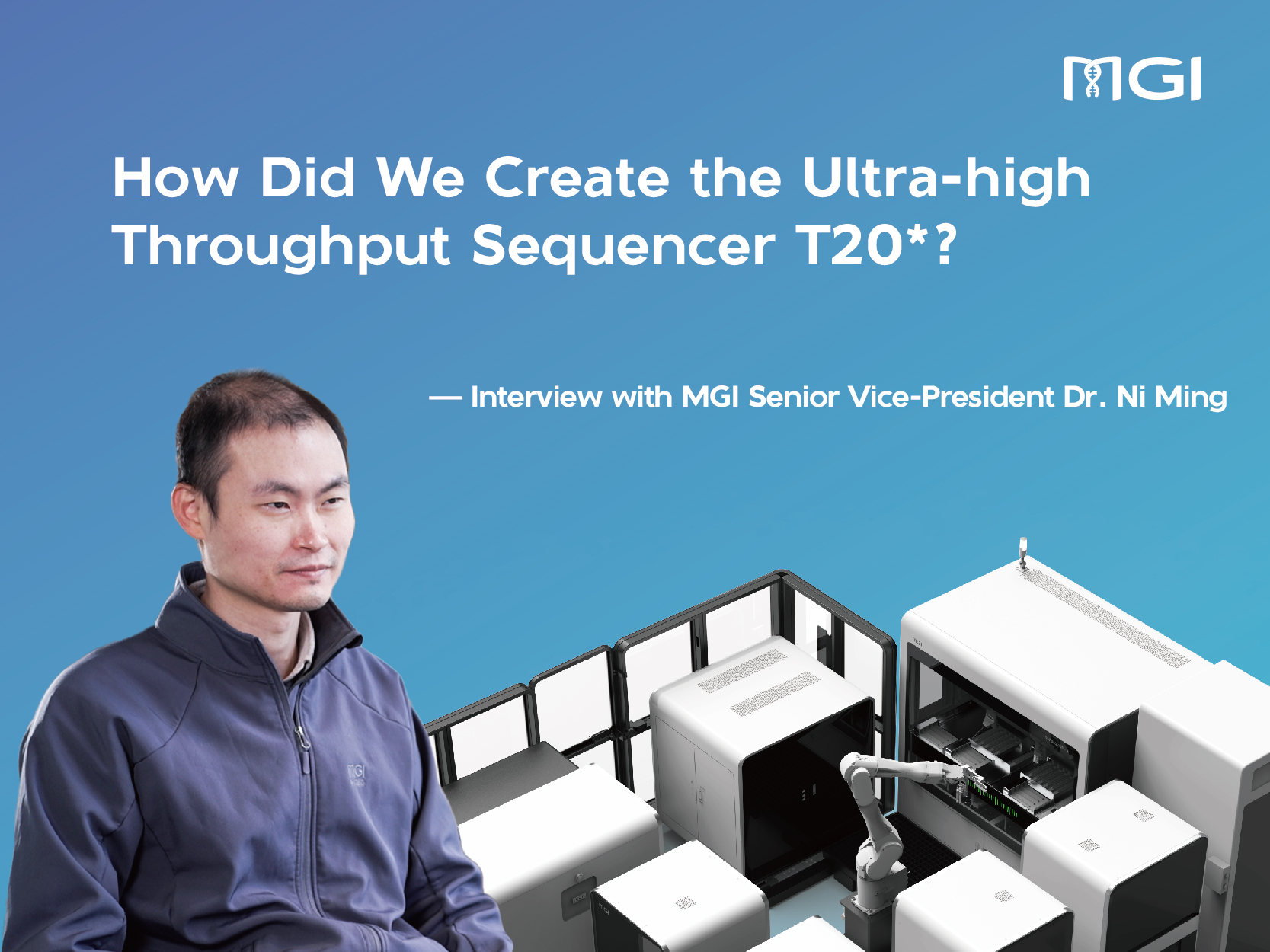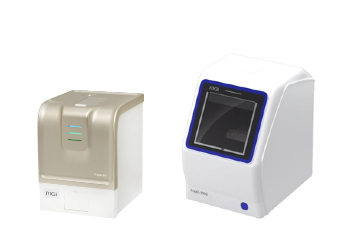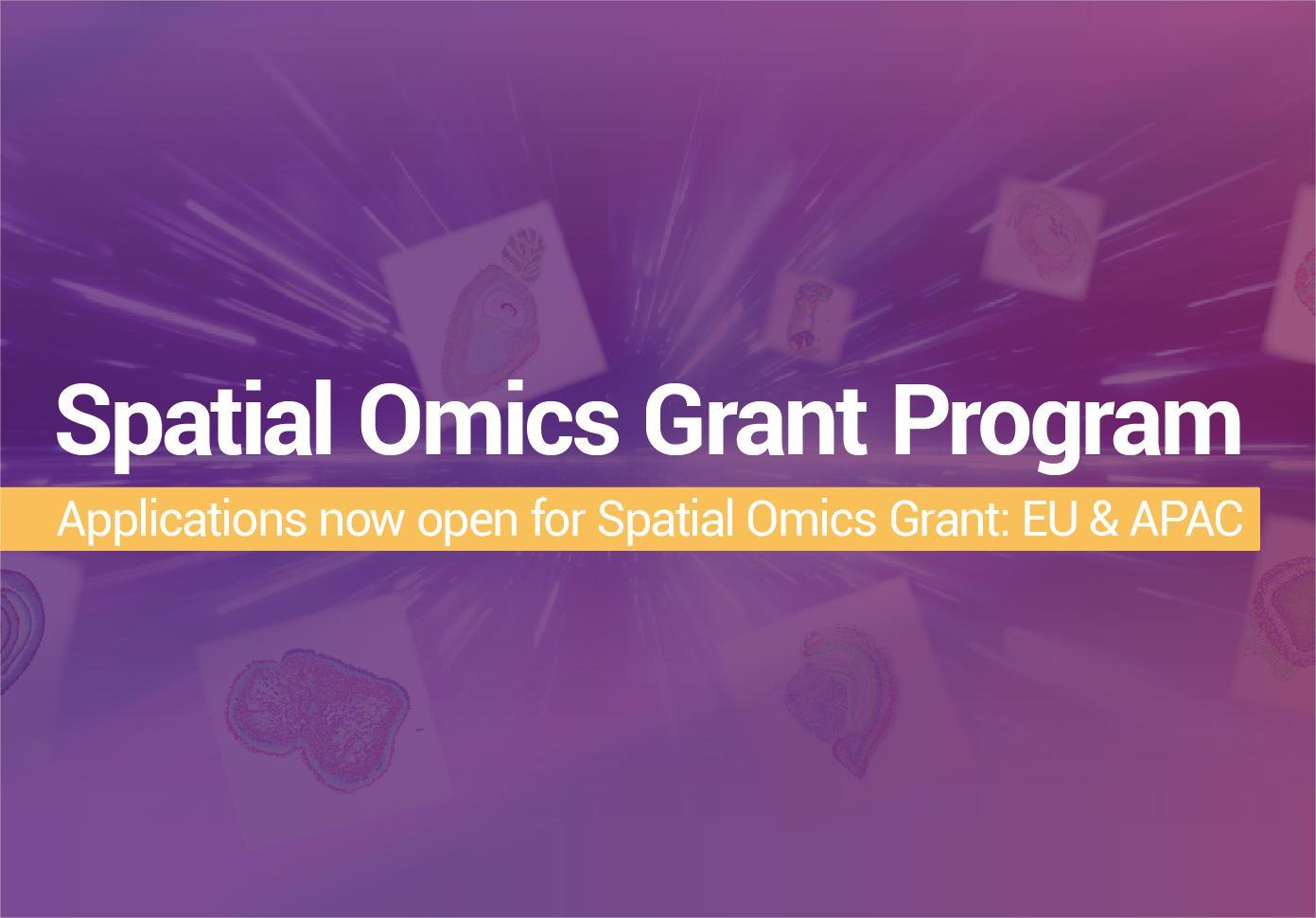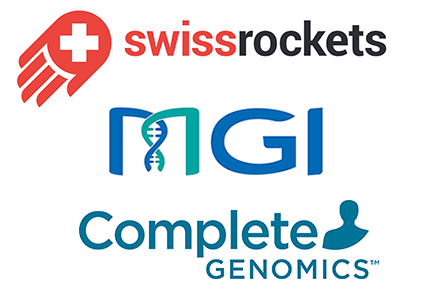In 2000, the first human genome sequence draft in history was produced after 13 years of efforts, at a cost of US$3.8 billion.
In 2007, the first complete map of the Chinese genome was completed, costing Chinese scientists months of work and US$3 million.
In 2023, it only takes 2.5 days to produce the genome sequences of more than 400 people, with a unit cost of less than US$100!
It has always been a common goal among the genetic sequencing industry to bring down the unit cost of genome sequencing to US$100 or lower. How we make it?
The recent launch of DNBSEQ-T20×2* (T20* for short) enables a $100 human genome era. Having set the record in single-machine throughput, T20* opens up new possibilities for the future of gene technology. Genetic sequencing, when made cost-efficient enough, will be on its way to becoming a highly influential technology that can help us achieve real breakthroughs in conventional healthcare and move toward an era of genomics-powered precision medicine. In this regard, the release of T20* took on a historic significance — it has brought us not only a new product, but also facilitated the development of global gene technology. T20* will help to deliver benefits of gene technology to more people by supporting research on genomics and promoting its application in medical care.

The genetic sequencer is hailed as the jewel in the crown within the genetic sequencing industry chain. Its technological improvement will bring about an increased throughput and lower costs. However, relevant technological breakthroughs did not arrive overnight. At first, scientists had hoped to analyze more than one billion amplified DNA fragments on a single slide, in order to reduce reagent consumption through large-scale parallel reaction and signal detection. The first model inspired by this idea, MGI's Revolocity ultra-high throughput sequencer, released in 2015 by MGI's American subsidiary Complete Genomics, can complete 10,000 cases of human Whole Genome Sequencing (hWGS) a year. By comparison, a single set of T20* can produce up to 50,000 hWGS per year, making it the most cost-efficient mass-produced sequencer with the highest throughput of its kind in the world. Here, MGI Senior Vice-President Dr. Ni Ming shared a detailed account of the innovation journey behind this achievement in his exclusive interview with Seqchina.cn.
The “First Impression” of T20*
First of all, T20* is not so different from most of its peers in components — consisting of a reagent module, a biochemical module, two optical modules, a power module, and an optional BIT module. However, what is unique about T20* is that it has achieved a breakthrough in the traditional structure of a closed biochemical liquid circuit system and instead adopted an open system with a modular structure. With such a machine, users are essentially accessing a "sequencing factory".
Secondly, in terms of technology roadmap, T20* features MGI's innovative dip-immersion biochemistry (details below), which is another technological breakthrough that improves sequencing efficiency and scale, and further reduces costs.
One T20* supports the operation of six slides simultaneously, producing up to 42Tb effective data per run with PE100 or even 72Tb per run with PE150. Each slide can independently read varying lengths, run different applications, and complete mixed sequencing of several libraries. The whole sequencing process in T20* is automated with two four-axis rotational robotic arms and a six-axis robot, with a single throughput 4.5-10.5 times ofhigher than other products of its kind (PE100, 42Tb/Run; PE150, 72Tb/Run).
"Minimizing the Cost of Sequencing Consumables"
Biochemical Module: The Key to Cost Reduction
The dip-immersion biochemistry technology applied to the biochemical module of T20* has improved the utilization rate of reagents and thus greatly reduced per-unit consumption, making sequencing more cost-efficient than ever. "It is through dip-immersion biochemistry technology that T20* is able to strike the perfect balance between sequencing reading length, throughput, data quality, and cost," Dr. Ni Ming lamented.
The utilization of biochemical reaction in flow cell often found in traditional sequencers, entails a complex control system of fluid and temperature. This biochemical reaction that features "fixed samples but flowing reagents" highly depends on the flowing pipe’s quality, including its flatness, temperature deformation, and high-precision fluid control. If the pipe fixed on the slide platform is not flat enough or is excessively deformed due to temperature change, the biochemical reaction may be incomplete and unsmooth, and the signal acquisition in the optical system will too be affected. The complex control system of fluid and temperature also means high hardware and maintenance costs. In addition, since the reagents in the continuous-flow biochemical reaction are non-reusable, the extremely low utilization rate also prevents cost reduction.
On the contrary, MGI's innovative dip-immersion biochemistry features "fixed reagents but transferable samples", which means that the coverless sequencing slides will be dipped consecutively in reagents for biochemical reactions, with temperature controlled precisely to 0.5 degrees Celsius to enable a uniform reaction. This helps solve the problem of uneven flow rate of reagents in traditional types, and free sequencing slides from surface bubbles. The biochemical reaction will be uniform and complete, with the utilization rate of the slide further improved. Besides, immersion fluidics on sequencing slides will ensure that the entire surface of these large slides is evenly heated, with little risk of deformation.
"Enabled by innovative dip-immersion biochemistry, T20* perfects the unthinkable process for consecutive robotic dipping of multiple slides in the same reagent," remarked Dr. Ni. "With our self-developed reagent formula, we can reuse sequencing reagents without cross-contamination, thus ensuring the highest utilization rate, sequencing quality and efficiency, largest throughput, and lowest cost. This is where the biggest advantage lies."
"Taking Technical Advantages to the Max"
Optical Module: The Cornerstone of T20* Ultra-high Throughput Signal Identification and Algorithm Output
The high-quality microscopic imaging system constitutes the core module of an ultra-high throughput sequencer. For its ultra-high throughput, T20* requires better optical imaging quality, precise image recognition, and faster data transmission. "MGI’s patented two-color fluorescence sequencing technology enables T20* to identify bases with high efficiency, greatly reducing the demand for optical hardware and computing resources, and also alleviating the pressure of big data transmission. This lays a solid technical foundation for the increase in sequencing throughput," said Dr. Ni.
The optical module in T20* has a liquid immersion optical lens combined with TDI (time delay and integration) line scan cameras for ultra-high throughput signal acquire. It is reported that the T20* optical module consists of an optical imaging module and an optical control module. The former is used for capturing the fluorescence signal on the sequencing slide, while the latter controls the optical imaging module and generates the original base sequence into Cal. (Cal. is a binary file format generated by "basecall", a base recognition software in MGI sequencers).
Dr. Ni highlighted the multi-dimensional breakthroughs of T20* imaging system in the collection, transmission, and identification of high-throughput signals. The first is the liquid immersion optical lens in its imaging module, which is immersed in the reagent solution (as the imaging medium). Compared to the air medium, the lens in the solution provides a higher numerical aperture, which means better spatial resolution. Therefore, it supports higher DNA sample density on the sequencing slides, which increased data output per unit area. Furthermore, T20* is equipped with TDI, which is a method of line scanning which provides dramatically increased responsivity compared to other video scanning methods. The TDI line scanning camera in T20* improves optical image acquisition efficiency by 2-3 times with a high-performance motion platform. More importantly, the high-quality, domestic-made large-field of view (FOV) optical objective lens provides a single FOV of over 2mm diameter, which helps capture more fluorescence signals per unit time with higher signal-to-noise ratio, forming a strong foundation for increase in throughput and system improvement.
"Achieving Exceptionally High Accuracy"
Sequencing Algorithm: The Basis for Super-large-scale Data Processing and Base Calling in T20
The large amount of fluorescence signals captured in unit time, which then have to be accurately and efficiently converted into the original base sequence information in real-time, poses a challenge to technical capabilities including real-time processing, signal conversion and data transmission. For improved data quality and minimized processing time, T20 is equipped with hardware acceleration technology, which overcomes the limit of traditional CPU architecture on computing capability and I/O capability, and improves data processing capacity by more than one hundred times.
Dr. Ni Ming stressed that the T20 R&D team proposed an asymmetric algorithm for asymmetric extracting the brightness of point light sources to support TDI line scan imaging. In tandem with the sequencing process, the algorithm will make dynamic adjustments in light of real-time parameters and significantly improve accuracy. At the same time, the integration of traditional image processing methods and deep neural network methods will also increase accuracy and applicability of the base calling algorithm.
"Maximizing Technical Support"
T20 One-stop Toolkit: The Impetus for Rapid Implementation of Large Population Sequencing Projects
MGI has made further efforts in helping with the rapid and easy implementation of large population genome projects, especially national initiatives with millions of samples. MGI has offered an optional one-stop toolkit, with T20 as the key component, which mainly includes sample preparation systems (MGISTP-7000 and MGISP-NE384) and reagents, automatic library construction instruments (MGISP-960 and MGISP-Smart 8) and library construction reagents. Users will also find a series of tools and modules designed for massive data processing, such as ZTRON Pro Appliance that provides Pb-level data storage and accelerated processing of bioinformatic analysis, as well as ZLIMS Pro+ for sample management, laboratory production, and genetic data management.
Among them, MGI's ZTRON Pro Appliance, specially designed for high-throughput sequencers. It integrates laboratory information management system (LIMS), bioinformatics accelerator and high-performance genetic data storage. ZTRON Pro Appliance can be used directly in the laboratory or in the traditional data centers. It can be deployed independently and scaled out easily. It is a reliable EuroPriSe-certified instrument that meets GDPR regulations. It allows independent offline deployment and horizontal scaling, helping users to reduces IT maintenance costs.
This one-stop toolkit reflects MGI's comprehensive understanding of the entire sequencing process. Rising to the challenges brought on by the calculation, storage, and management of massive genetic data, MGI offers cost-efficient technologies and products with high flexibility and scalability. MGI has created a full range of tools throughout the whole sequencing process, according to Dr. Ni Ming. These tools not only automate an end-to-end high-throughput "sample to data" process, but also provide a platform for sample pretreatment, library construction and data analysis, and even a platform for biological sample management. With these in mind, issues such as the lack of the right tools in large-scale genomics or multi-omics research projects can be adequately addressed.
What is impressive about T20* is that, through innovations and applications in biochemistry, optics, algorithms and supporting tools, the instrument greatly reduces sequencing cost, ensures ultra-high throughput and guarantees the best reliable sequencing data. This revolutionary high-tech product speaks volumes about China's remarkable capacity in conducting domestic R&D on product innovation.
At the end of the interview, Dr. Ni Ming summarized, “MGI has launched a variety of life science and technology core tools such as genetic sequencers, automated production lines, bio-banks, as well as BIT products that are centered on ‘data storage, reading, computing and application’. MGIers have been working tirelessly towards new breakthroughs amid their pursuit of excellence through constant technical improvement in core tools, for the benefit of our world. The launch of T20* represents an extensive expansion of MGI's product line that includes low to medium, to high and ultra-high throughput. Looking ahead, we will continue down the road with our three key business lines as we renew our efforts in bringing more choices and opportunities to the life science industry.”
*Unless otherwise informed, StandardMPS and CoolMPS sequencing reagents, and sequencers for use with such reagents, are not available in Germany, Spain, UK, Sweden, Belgium, Italy, Finland, Czech Republic, Switzerland, Portugal, Austria, and Romania. Unless otherwise informed, StandardMPS sequencing reagents, and sequencers for use with such reagents are not available in Hong Kong.
*Products are provided for Research Use Only. Not for use in diagnostic procedures (except as specifically noted).



 Sequencer Products: SEQ ALL
Sequencer Products: SEQ ALL















 Technologies
Technologies Applications
Applications Online Resources
Online Resources Data Bulletins
Data Bulletins Service & Support
Service & Support Global Programs
Global Programs Introduction
Introduction Newsroom
Newsroom Doing Business With Us
Doing Business With Us Creative Club
Creative Club













